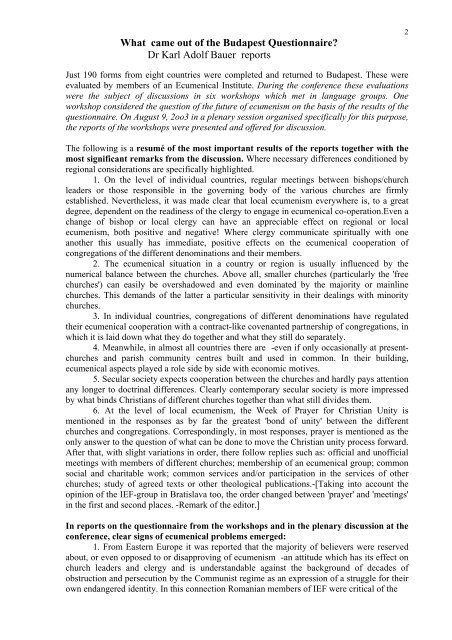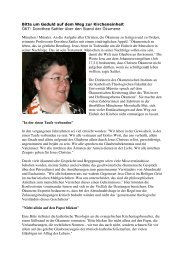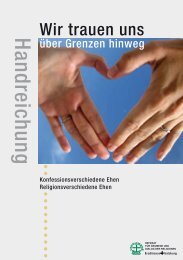S U R V E Y of current evidence of ecumenism ... - ARGE Oekumene
S U R V E Y of current evidence of ecumenism ... - ARGE Oekumene
S U R V E Y of current evidence of ecumenism ... - ARGE Oekumene
You also want an ePaper? Increase the reach of your titles
YUMPU automatically turns print PDFs into web optimized ePapers that Google loves.
What came out <strong>of</strong> the Budapest Questionnaire?Dr Karl Adolf Bauer reports2Just 190 forms from eight countries were completed and returned to Budapest. These wereevaluated by members <strong>of</strong> an Ecumenical Institute. During the conference these evaluationswere the subject <strong>of</strong> discussions in six workshops which met in language groups. Oneworkshop considered the question <strong>of</strong> the future <strong>of</strong> <strong>ecumenism</strong> on the basis <strong>of</strong> the results <strong>of</strong> thequestionnaire. On August 9, 2oo3 in a plenary session organised specifically for this purpose,the reports <strong>of</strong> the workshops were presented and <strong>of</strong>fered for discussion.The following is a resumé <strong>of</strong> the most important results <strong>of</strong> the reports together with themost significant remarks from the discussion. Where necessary differences conditioned byregional considerations are specifically highlighted.1. On the level <strong>of</strong> individual countries, regular meetings between bishops/churchleaders or those responsible in the governing body <strong>of</strong> the various churches are firmlyestablished. Nevertheless, it was made clear that local <strong>ecumenism</strong> everywhere is, to a greatdegree, dependent on the readiness <strong>of</strong> the clergy to engage in ecumenical co-operation.Even achange <strong>of</strong> bishop or local clergy can have an appreciable effect on regional or local<strong>ecumenism</strong>, both positive and negative! Where clergy communicate spiritually with oneanother this usually has immediate, positive effects on the ecumenical cooperation <strong>of</strong>congregations <strong>of</strong> the different denominations and their members.2. The ecumenical situation in a country or region is usually influenced by thenumerical balance between the churches. Above all, smaller churches (particularly the 'freechurches') can easily be overshadowed and even dominated by the majority or mainlinechurches. This demands <strong>of</strong> the latter a particular sensitivity in their dealings with minoritychurches.3. In individual countries, congregations <strong>of</strong> different denominations have regulatedtheir ecumenical cooperation with a contract-like covenanted partnership <strong>of</strong> congregations, inwhich it is laid down what they do together and what they still do separately.4. Meanwhile, in almost all countries there are -even if only occasionally at presentchurchesand parish community centres built and used in common. In their building,ecumenical aspects played a role side by side with economic motives.5. Secular society expects cooperation between the churches and hardly pays attentionany longer to doctrinal differences. Clearly contemporary secular society is more impressedby what binds Christians <strong>of</strong> different churches together than what still divides them.6. At the level <strong>of</strong> local <strong>ecumenism</strong>, the Week <strong>of</strong> Prayer for Christian Unity ismentioned in the responses as by far the greatest 'bond <strong>of</strong> unity' between the differentchurches and congregations. Correspondingly, in most responses, prayer is mentioned as theonly answer to the question <strong>of</strong> what can be done to move the Christian unity process forward.After that, with slight variations in order, there follow replies such as: <strong>of</strong>ficial and un<strong>of</strong>ficialmeetings with members <strong>of</strong> different churches; membership <strong>of</strong> an ecumenical group; commonsocial and charitable work; common services and/or participation in the services <strong>of</strong> otherchurches; study <strong>of</strong> agreed texts or other theological publications.-[Taking into account theopinion <strong>of</strong> the IEF-group in Bratislava too, the order changed between 'prayer' and 'meetings'in the first and second places. -Remark <strong>of</strong> the editor.]In reports on the questionnaire from the workshops and in the plenary discussion at theconference, clear signs <strong>of</strong> ecumenical problems emerged:1. From Eastern Europe it was reported that the majority <strong>of</strong> believers were reservedabout, or even opposed to or disapproving <strong>of</strong> <strong>ecumenism</strong> -an attitude which has its effect onchurch leaders and clergy and is understandable against the background <strong>of</strong> decades <strong>of</strong>obstruction and persecution by the Communist regime as an expression <strong>of</strong> a struggle for theirown endangered identity. In this connection Romanian members <strong>of</strong> IEF were critical <strong>of</strong> the





